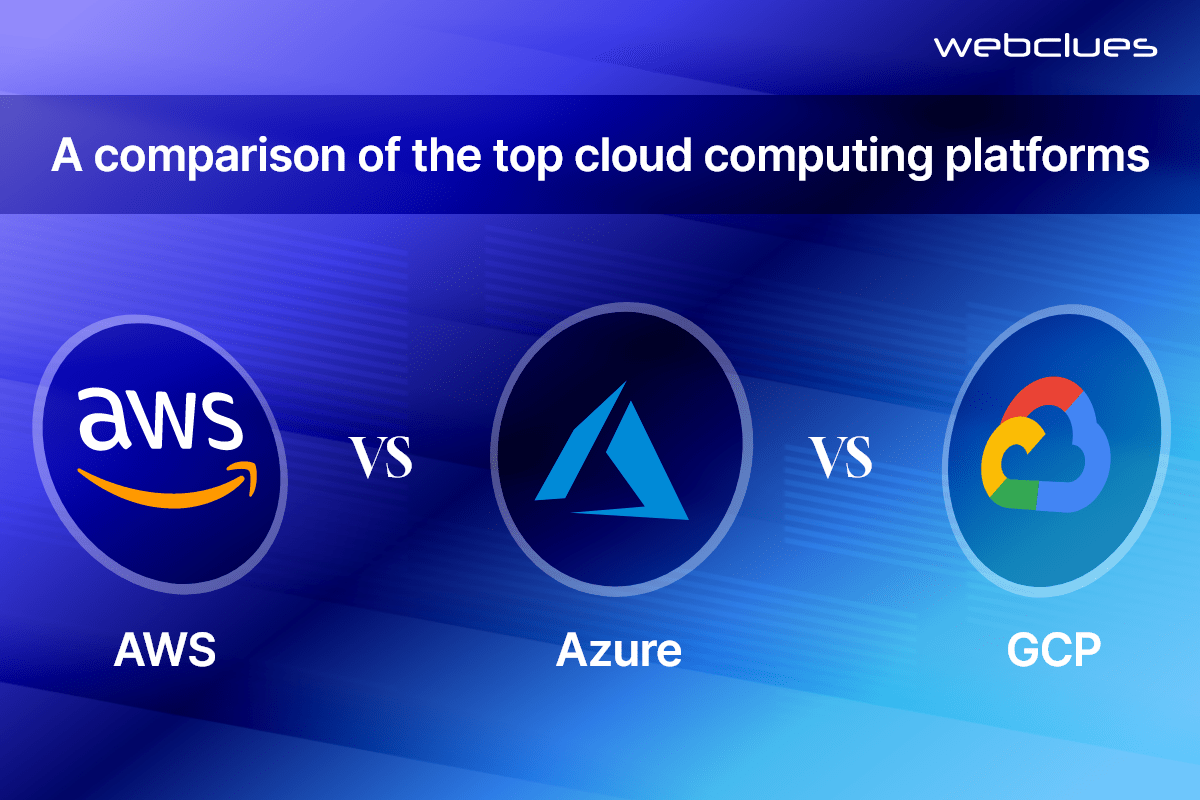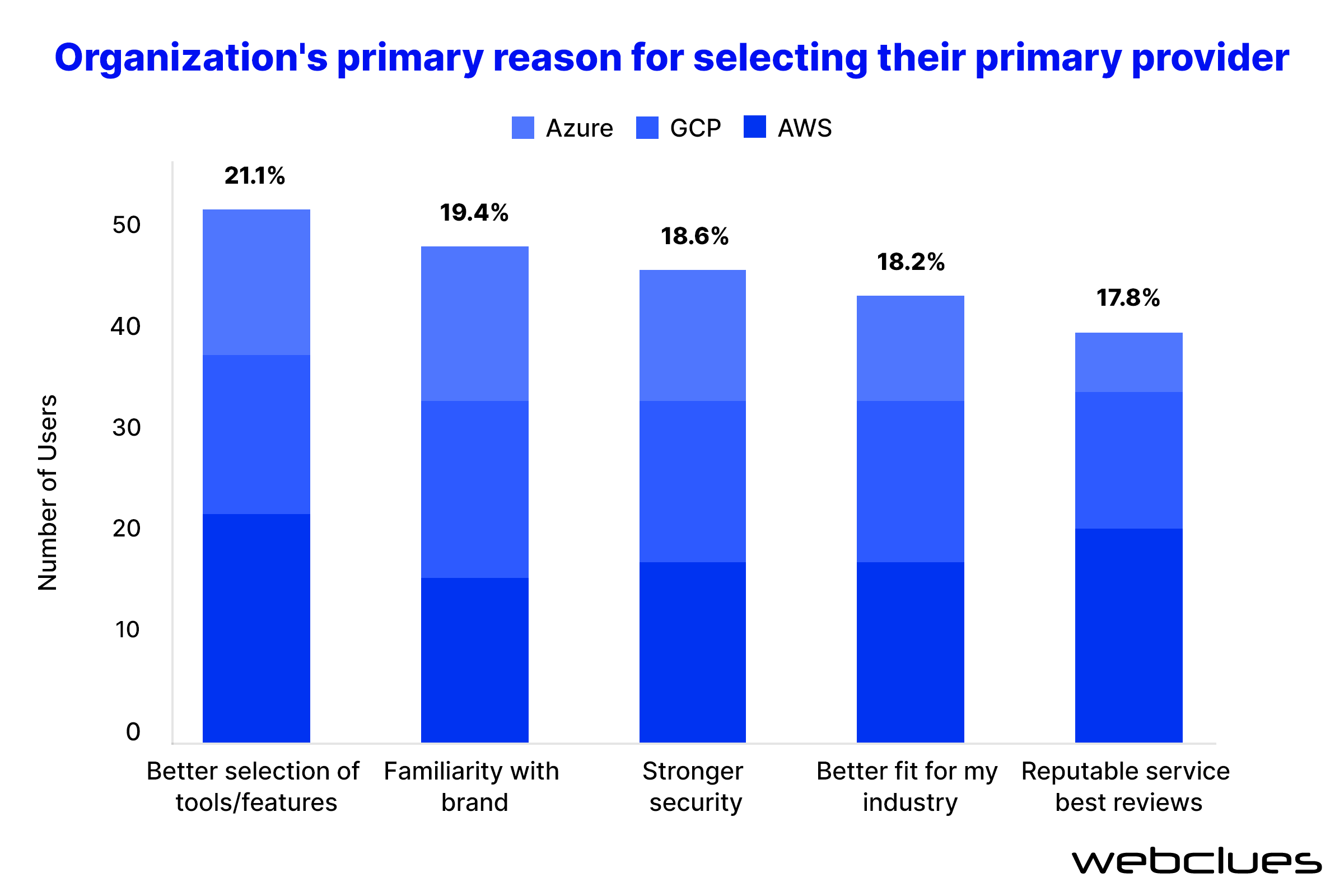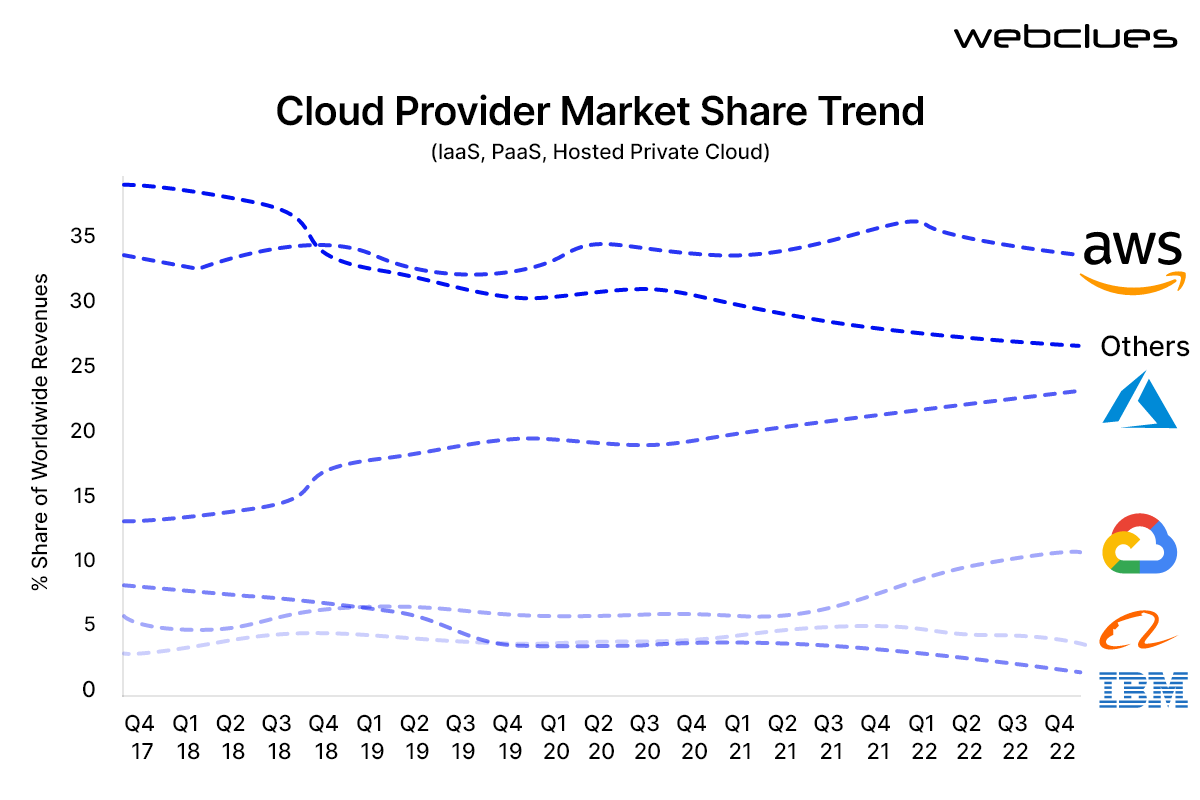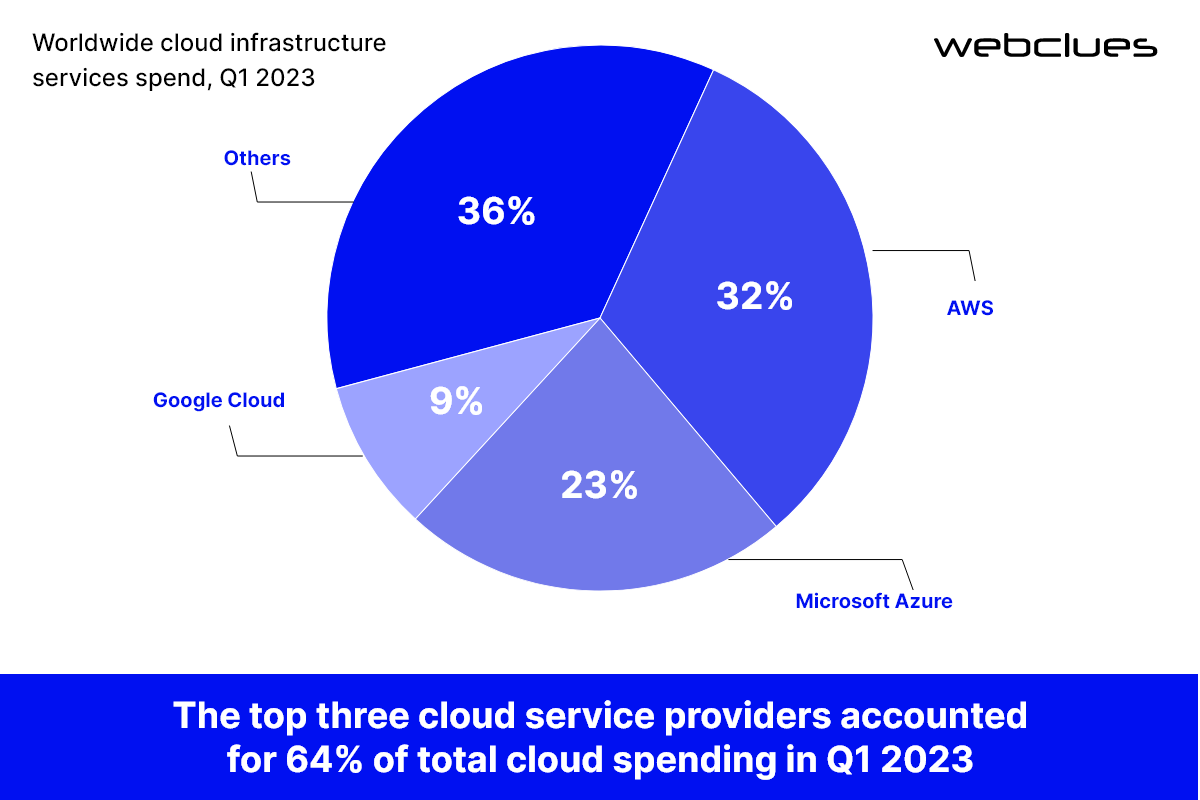A comparison of the top cloud computing platforms: AWS, Azure, and GCP

The journey of Cloud Computing has been nothing short of remarkable, evolving significantly from its inception. It's no longer a matter of whether to embrace Cloud Computing or not; the contemporary challenge lies in selecting the most suitable cloud platform. Amidst the plethora of cloud computing service providers saturating the market, three prominent names emerge - AWS, Azure, and Google Cloud Platform. These three giants stand tall as the frontrunners in the Cloud Computing landscape. So, faced with the complex decision of AWS vs. Azure vs. Google Cloud, how does one arrive at a definitive choice? This blog aims to provide comprehensive insights, guiding you through the process of making informed decisions pertaining to Cloud Computing.

Diving into the depths of this blog, we will delve into the nuances of AWS, Azure, and GCP, shedding light on their distinctive attributes and capabilities.
Amazon Web Services (AWS)
Amazon Web Services (AWS) emerges as the world's most comprehensive and widely embraced cloud platform. Renowned for its expansive repertoire of on-demand cloud computing services, AWS caters to individuals, corporations, and governmental entities through subscription-based models.
Key Highlights of AWS:
- Encompasses a vast spectrum of over 200 services.
- Boasts an impressive presence of 99 availability zones spanning 31 Regions.
A cohesive blend of infrastructure as a service (IaaS), platform as a service (PaaS), and software as a service (SaaS) offerings constitute its foundation.
Originating in 2006 as Amazon's strategic extension, AWS has matured into a powerhouse of cloud technology. Its service offerings span an extensive array, ranging from computing, storage, and databases to networking, analytics, machine learning, IoT, and security solutions.
Its widespread adoption is evidenced by the presence of over 1 million active customers hailing from diverse industries, aided by an equally large number of AWS-managed service providers.
As the pioneer and incumbent leader in cloud computing, AWS positions itself as a versatile choice suitable for businesses of various sizes. Its comprehensive suite of services is particularly beneficial for those who hire AWS developers, citing swift scalability.
In the spectrum of cloud computing platforms, AWS's time-tested expertise, unparalleled range of services, and global dominance solidify its standing as a preferred choice for businesses across various domains.
Microsoft Azure
Microsoft's Azure is a prominent player in cloud computing, offering a diverse range of services for creating, testing, deploying, and managing cloud-based applications.
Key Aspects of Azure:
- Nearly 200 services.
- Available in 78 regions across 140 countries.
Launched in 2010, Azure is now the second-largest cloud platform, featuring over 200 services covering computing, storage, databases, networking, analytics, machine learning, IoT, and security.
With a global presence in 66 regions and 140 availability zones, Azure serves 200,000+ active customers across various industries.
Microsoft Azure Cloud Managed Services is an optimal choice for businesses entrenched in the Microsoft ecosystem and those aiming for seamless hybrid cloud solutions.
Azure's integration with Microsoft's ecosystem and wide-ranging services make it a compelling option for organizations seeking innovation and efficiency in their cloud initiatives.
Google Cloud Platform (GCP)
Google Cloud Platform (GCP), powered by Google, is a robust player in cloud computing. It operates on the same infrastructure supporting Google's iconic products like Google Search and YouTube.
GCP's Journey: Launched in 2011 to bolster Google's services, GCP expanded to provide enterprise solutions to a wider audience.
Key Highlights:
As the third-largest global cloud platform, GCP offers over 100 services covering computing, storage, databases, networking, analytics, machine learning, IoT, and security.
- Global Reach: With 24 geographic regions and 73 availability zones, GCP serves a diverse clientele worldwide.
- Choosing GCP: Ideal for data-intensive operations, machine learning, and cost-effective data management.
GCP's swift ascent in less than a decade underscores its dedication to delivering top-tier cloud services. It's your go-to for data processing and embracing cutting-edge tech in the dynamic cloud landscape.
AWS vs. Azure vs. GCP: Market Share & Growth
In the competitive landscape of cloud computing, it could be seen that while there was a minor slowdown in enterprise investment in cloud infrastructure services in the fourth quarter of 2022, the leading trio maintained their stronghold. Together, they accounted for a substantial two-thirds of the overall market.
During this quarter, global spending on cloud services exceeded $61 billion, representing a remarkable increase of over $10 billion compared to the corresponding period in the previous year.

Moreover, according to a report by Canalys, the top three hyper-scale cloud providers - AWS, Microsoft Azure, and Google Cloud dominated customer spending in Q1 2023, capturing an impressive 64% share. This aligns with the remarkable 19% surge in global spending on cloud infrastructure services, which soared to a substantial $66.4 billion during the same period.

AWS vs Azure vs GCP: Popular Use Cases
As the oldest player in the cloud market, AWS has garnered a massive community and user base. This broad support has attracted renowned customers, including household names like Netflix, Airbnb, NASA, Facebook, Samsung, Adobe, LinkedIn, and more.

Over time, Azure has steadily secured an impressive roster of high-profile clients. Currently, it proudly serves nearly 80 percent of Fortune 500 companies. Among its notable clientele are industry giants such as Intel, MasterCard, Disney, HP, Honeywell, Apple, and many more.

Google Cloud's association with the infrastructure behind Google Search and YouTube has instilled confidence in numerous top-tier enterprises. Notable names among Google Cloud's prestigious clientele include HSBC, PayPal, 20th Century Fox, Twitter (X), Domino’s, and many others.

Exploring Service Portfolios
Now, let's delve into the extensive service offerings provided by these three cloud giants. AWS, with its five-year head start, has evolved to offer the most comprehensive and functionally rich computing services.
Here's a snapshot of their service offerings:
- AWS leads the pack with a staggering 200+ services.
- Azure follows closely with an extensive offering of over 100+ services.
- Google Cloud, while catching up, currently provides around 60+ services.
These services are categorized into domains like computing, database, storage, and networking. Let's explore how they align in these key areas.
| Computing | Encompasses services such as Amazon Elastic Compute Cloud (EC2), Amazon Elastic Container Service (ECS), and Amazon Lambda. | Azure Virtual Machines, Container Service, Azure Functions. | Featuring Google Compute Engine. |
| Storage | Includes offerings like Amazon Simple Storage Service (S3), Amazon Relational Database Service (RDS), and Amazon DynamoDB. | Blob Storage, Data Lake Storage, SQL Database. | Includes Google Cloud Storage (GCS), Google BigQuery, and Google Cloud Spanner. |
| Networking | Provides Amazon Virtual Private Cloud (VPC), Amazon Route 53, and Amazon CloudFront. | Virtual Network, Traffic Manager, Content Delivery Network. | Offers Google Cloud Networking (GCN), Google Cloud Load Balancing, and Google Cloud CDN. |
| Databases | Comprises Amazon RDS, Amazon Aurora, and Amazon DynamoDB. | SQL Database, Cosmos DB, MySQL Database. | Encompasses Google Cloud SQL, Google Cloud Bigtable, and Google Cloud Datastore. |
| Analytics | Incorporates Amazon Redshift, Amazon Athena, and Amazon QuickSight. | Data Factory, Data Lake Analytics, Machine Learning. | Utilize Google Cloud Dataproc, Google Cloud Dataflow, and Google Cloud Data Fusion. |
| Machine Learning | Enriched with Amazon SageMaker, Amazon Rekognition, and Amazon Lex. | Machine Learning, Bot Service, Cognitive Services. | Access Google Cloud AI Platform, Google Cloud AutoML, and Google Cloud TPUs. |
| Internet of Things (IoT) | Features Amazon Greengrass, Amazon Kinesis, and Amazon IoT Core. | IoT Hub, IoT Edge, IoT Central. | Solutions like Google Cloud IoT Core, Google Cloud Pub/Sub, and Google Cloud Dataflow power IoT ventures. |
Pricing Comparison
When selecting a cloud platform, pricing is a paramount factor to weigh. It's important to note that pricing can fluctuate based on various factors, including the specific service or product, the geographic region or zone, the duration of usage, and any available discounts or incentives.
To facilitate your decision-making process, let's now compare the pricing models for common services and products across the three leading cloud platforms.
| Machine Type | AWS | AZURE | GCP |
| Smallest Instance | With AWS, a basic instance comprising 2 virtual CPUs and 8 GB of RAM is priced at approximately $69 per month. | In Azure, a similar instance with 2 vCPUs and 8 GB of RAM will set you back approximately $70 per month. | In comparison to AWS, GCP offers a more affordable option for a basic instance with 2 virtual CPUs and 8 GB of RAM, priced at approximately $52 per month, which is 25 percent lower in cost. |
| Largest Instance | AWS provides its largest instance, featuring an impressive 3.84 TB of RAM and 128 vCPUs, at an hourly rate of approximately $3.97. | Azure's largest instance boasts a substantial 3.89 TB of RAM and 128 vCPUs, available at an hourly rate of approximately $6.79. | GCP claims the top spot with its largest instance, packing 3.75 TB of RAM and 160 vCPUs, offered at an hourly rate of approximately $5.32. |
Another noteworthy aspect to consider is the billing models these cloud giants employ. AWS has recently introduced pay-per-minute billing, a move to provide more flexibility to its users. On the other hand, Azure already offers pay-per-minute billing. However, Google Cloud takes the lead by offering pay-per-second billing, a model that can lead to substantial savings compared to AWS or Azure.
Moreover, Google Cloud goes the extra mile by providing various discounts, potentially allowing customers to save up to 50 percent in some instances when compared to AWS. Gartner highlights Google's commitment to offering deep discounts and remarkably flexible contracts, making it a formidable contender in the cloud space.
Advantages and Disadvantages
1. AWS
- Advantages
Scalability: AWS excels in scalability and adaptability, making it ideal for businesses dealing with fluctuating workloads. It empowers companies to effortlessly adjust resource levels as needed without binding contracts or upfront commitments. Moreover, AWS offers auto-scaling tools that intelligently manage capacity based on real-time traffic and demands.
Reliability: When business continuity is paramount, AWS shines with its exceptional reliability and availability. With a steadfast commitment to a minimum 99.99% uptime for core services, AWS provides multiple layers of redundancy, including backup, disaster recovery, and fault tolerance. To further bolster confidence, AWS equips businesses with robust monitoring and alerting tools, ensuring the health and performance of resources are consistently tracked.
Security: Security is a top priority for AWS, especially for businesses guarding sensitive data and applications. It fortifies its platform with a comprehensive suite of security features like encryption, firewalls, identity and access management (IAM), key management service (KMS), security groups, and virtual private cloud (VPC). AWS also remains compliant with a spectrum of industry standards and regulations such as PCI DSS, HIPAA, and GDPR, providing peace of mind for businesses in highly regulated sectors.
Innovation: AWS stands at the forefront of innovation, serving businesses that thirst for cutting-edge technologies. It offers a rich tapestry of services and products that enable businesses to build, deploy, and run applications harnessing the power of artificial intelligence (AI), machine learning (ML), big data analytics, serverless computing, blockchain, and more. AWS's support for various programming languages, frameworks, tools, and platforms streamlines the process of rapid development and experimentation, empowering businesses to stay ahead in the technological race.
- Disadvantages
Complexity: While AWS offers immense capabilities, it can be a bit overwhelming, particularly for newcomers to the cloud or those with limited technical know-how. It comes with a learning curve and often demands extensive configuration and customization to unleash its full potential. Additionally, AWS's pricing structure can be intricate, sometimes posing challenges in comprehension and cost prediction.
Vendor Lock-in: AWS's extensive proprietary services and products can inadvertently lead to vendor lock-in for businesses that heavily depend on them. This lock-in can complicate migration efforts to other cloud platforms, mainly due to compatibility issues and data transfer expenses. Such dependence can also restrict businesses' flexibility in choosing the most suitable solutions for their unique requirements.
Customer Support: For businesses seeking timely and effective assistance, AWS's customer support may sometimes fall short. Premium support plans come at an extra cost, promising faster response times and dedicated account managers. However, the quality and availability of support can be inconsistent across various regions and services, posing a potential challenge for some businesses.
2. Azure
- Advantages
Integration: Azure stands out with its exceptional integration and seamless compatibility with Microsoft's extensive suite of products and services. This means businesses can capitalize on their existing investments and expertise in Microsoft technologies like Windows, Office 365, SQL Server, and .NET. Azure goes further by offering smooth migration pathways and robust hybrid cloud solutions for companies aiming to extend or transition from on-premises infrastructure to the cloud.
Hybrid Cloud: Azure takes the lead in offering substantial hybrid cloud capabilities, providing flexibility for businesses seeking to strike a balance between their cloud and on-premises resources. Azure's array of services and products empowers businesses to efficiently manage and secure their hybrid environments. Furthermore, Azure supports various hybrid scenarios, including backup, disaster recovery, data synchronization, and edge computing, catering to diverse business needs.
Enterprise Focus: Azure demonstrates a strong commitment to meeting the intricate and diverse requirements of large organizations. Its services and products are tailored to specific industry verticals like healthcare, finance, education, and government, making it a compelling choice for enterprises with specialized needs. Azure complements this with enterprise-grade features encompassing governance, compliance, identity management, and robust security management.
- Disadvantages
Reliability Challenges: Azure has faced occasional challenges in maintaining the same level of availability and reliability as its competitors. Past incidents of major outages and service disruptions have impacted customer operations and tarnished its reputation. Azure's fewer regions and availability zones compared to AWS and GCP can also pose limitations on its global reach and overall performance.
Technical Hurdles: Azure tends to grapple with more frequent technical glitches and bugs when compared to its counterparts. These issues encompass aspects like stability, performance, functionality, and compatibility of its services and products. The platform's frequent changes and updates can sometimes lead to unforeseen errors and disruptions, affecting user experience.
Learning Curve: Azure presents a steeper learning curve, particularly for businesses unfamiliar with Microsoft technologies or cloud computing in general. Its user interface can be complex and confusing, making navigation and usage challenging. Moreover, the platform may lack comprehensive documentation and tutorials, which can impede businesses in the learning and troubleshooting process.
3. Google Cloud Platform
- Advantages
Outstanding Performance: GCP excels in delivering top-notch performance and speed, making it ideal for managing extensive or data-intensive workloads. It harnesses Google's robust infrastructure and network, the same backbone that powers renowned services like Search, YouTube, and Gmail. GCP offers an array of services and products geared toward performance optimization, including Compute Engine, Cloud Storage, and Cloud CDN.
Cost-Efficiency: GCP stands out in terms of cost-effectiveness and resource efficiency. It caters to businesses looking to hire Google Cloud Platform developers to trim operational expenses or enhance resource utilization. With various pricing models and options, GCP enables businesses to pay for precisely what they use or realize savings through long-term commitments. Additionally, Google Cloud Platform (GCP) Managed services equip businesses with tools and features for effective cost monitoring and management, such as the Cloud Billing API and Cloud Pricing Calculator.
Advanced Analytics: GCP shines in the realm of analytics and AI/ML capabilities, offering businesses the means to extract valuable insights from their data and harness cutting-edge technologies for their applications. The platform provides a rich array of services and products designed for data collection, storage, processing, analysis, visualization, and modeling. These include BigQuery, Cloud Dataflow, Cloud Dataproc, Cloud Datalab, Cloud ML Engine, TensorFlow, and more.
- Disadvantages
Limited Global Reach: GCP's global presence falls short compared to AWS and Azure. With fewer geographic regions and availability zones, GCP may face challenges in ensuring optimal application availability and performance in specific regions or countries. This limitation can also impact businesses or customers with strict data storage and processing location requirements.
Feature Gap: GCP offers fewer features and services compared to AWS and Azure, potentially omitting some popular or essential offerings available in other cloud platforms. This can result in reduced functionality and adaptability for applications in specific scenarios or use cases. It may also hinder compatibility and interoperability with other cloud platforms and technologies.
Maturation Gap: GCP, being relatively newer and less experienced than AWS and Azure, may not exhibit the same level of maturity, reliability, security, or support. This disparity may manifest in technical issues or bugs affecting functionality and overall quality. Additionally, GCP may have a smaller and less active community of developers and experts, which can impact the availability of support and guidance through forums, blogs, webinars, and other channels.
Final Verdict
As we draw the curtain on this comparison, the path forward becomes clear. The choice between AWS, Azure, and GCP hinges on your specific needs, your existing ecosystem, and your vision for the future.
Are you ready to embark on your cloud journey? At Webclues Infotech, we stand as your trusted guide, ready to lead you through the ever-expanding horizons of cloud computing. With our expertise as cloud computing service providers, we empower you to harness the full potential of these platforms. Your digital transformation begins here, and the possibilities are limitless.
Take the next step. Contact us today, and let's explore the boundless opportunities that cloud computing offers.
Build Your Agile Team
Hire Skilled Developer From Us
Need assistance in choosing the right cloud platform for your business needs?
Be it AWS, Azure, or GCP, we offer comprehensive cloud computing services. Whatever your unique requirement, we will help you with the best-suited solutions.
Book Free ConsultationOur Recent Blogs
Sharing knowledge helps us grow, stay motivated and stay on-track with frontier technological and design concepts. Developers and business innovators, customers and employees - our events are all about you.
Contact
Information
India
Ahmedabad
1007-1010, Signature-1,
S.G.Highway, Makarba,
Ahmedabad, Gujarat - 380051
Rajkot
1308 - The Spire, 150 Feet Ring Rd,
Manharpura 1, Madhapar,
Rajkot, Gujarat - 360007
UAE
Dubai
Dubai Silicon Oasis, DDP,
Building A1, Dubai, UAE
USA
Atlanta
6851 Roswell Rd 2nd Floor,
Atlanta, GA, USA 30328
New Jersey
513 Baldwin Ave, Jersey City,
NJ 07306, USA
California
4701 Patrick Henry Dr. Building
26 Santa Clara, California 95054
Australia
Queensland
120 Highgate Street,
Coopers Plains,
Brisbane, Queensland 4108
UK
London
85 Great Portland Street, First
Floor, London, W1W 7LT
Canada
Burlington
5096 South Service Rd,
ON Burlington, L7l 4X4
Let’s Transform Your Idea into
Reality. Get in Touch





